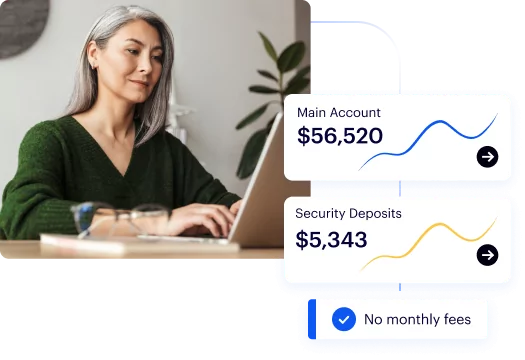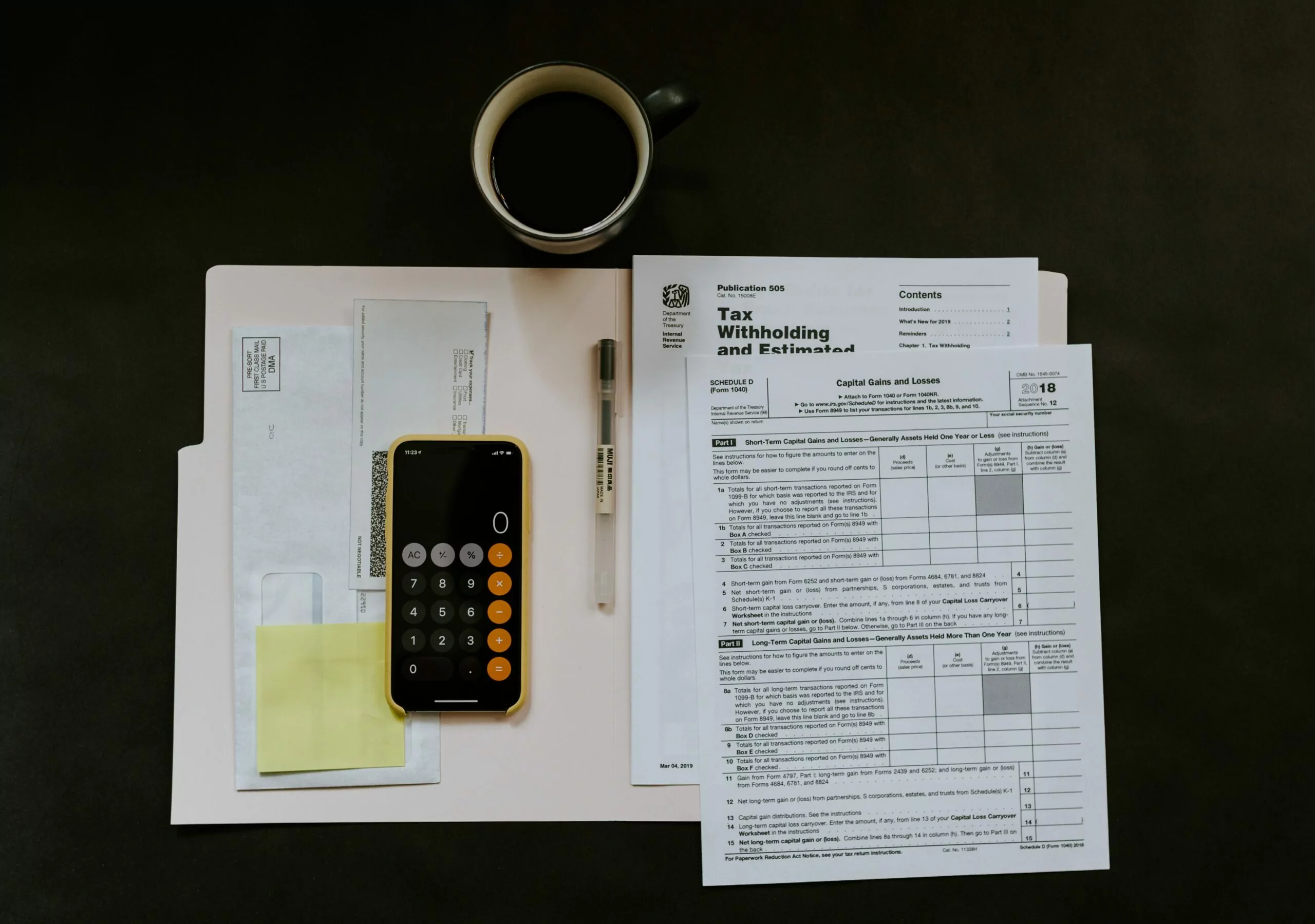Managing rental properties can become a profitable practice. But looking at your real estate as a business is also important. To be successful, you need to invest in improvements, cover necessary bills, and take care of all your expenses for rental property on time and in full.
In this article, we will define rental property expenses, share the 14 most common rental property expenses, teach you how to estimate and calculate these costs, and how to use Baselane to track your property expenses.
6 ways to reduce your rental property taxes
Use these tax-saving tips to keep more money in your pocket.
How to Estimate Rental Property Expenses
Before going any further, let’s take a moment to define rental home expenses.
Rental property expenses are costs related to your rental property business. While it’s true that home insurance covers certain accident-related expenses, property costs usually refer to expenses that owners have to cover out of pocket.
But how do you estimate these expenses? Here are three techniques:
Speak to Local Property Managers
Your rental property will likely have similar expenses to other homes in your area. Therefore, it’s always a good idea to speak with local property managers and get an idea of what operating expenses they cover.
You can learn more about property taxes, rental income, and mortgage interests, all of which will influence your monthly costs.
Network with Regional Real Estate Investors
You’ll likely have varying rental property operating expenses if you have multiple properties across several locations in the same region. You can take a similar approach to find more information by networking with real estate investors at regional events.
Networking will allow you to benchmark rental property expenses and costs with other investment property owners and learn how to increase your net operating income.
Contact Utility Companies
Utility bills are always close to every landlord’s expenses list. Rates vary significantly based on the region, type of service, size of the property, and many other variables.
As a rental property owner, it’s possible to phone different providers and inquire about their rates and plans. If you already have utility providers, you can contact other alternatives and verify that you’re paying the lowest possible rates.
14 Common Rental Property Expenses
Now that we’ve discussed a few ways to learn more about your potential business costs let’s review the most common rental property expenses list. We’ve grouped the list into two categories for your convenience: Upfront and One-time expenses and recurring expenses.
Summary of 14 Common Rental Property Expenses
| One-Time Expenses | Recurring Expenses | Helpful Resources | |
|---|---|---|---|
| 1. Business Registration and Licenses | Register an LLC for $29 plus state fee | ||
| 2. Home Inspections | |||
| 3. Appraisal Fees | |||
| 4. Marketing and Advertising | |||
| 5. Tenant Screening and Other Broker Fees | Screen Tenants Online with SmartMove by Transunion | ||
| 6. Property Taxes | |||
| 7. Maintenance and Repairs | |||
| 8. Utilities | |||
| 9. Property Management Services | Advanced Property Management Guide | ||
| 10. Rental Property Insurance or a Landlord Policy | Get a free insurance quote and find out if you can save $100’s. | ||
| 11. Vacancy Costs | |||
| 12. Travel Expenses | |||
| 13. Office Expenses | |||
| 14. Accounting and Professional Services |
Upfront and One-time expenses
Business Registration and Licenses
Before renting your property, most real estate investors establish a company (e.g., LLC). Remember to account for these costs in your budget as they are tax deductible.Home Inspections
Home inspections are necessary under some circumstances. If you find yourself in one of these, you may have to pay for a home inspector to assess your investment property and deliver a report.Appraisal Fees
Whether you’re selling or renting, having an appraiser inspect your house and determine a fair value may be the best way to set a price, but this also represents another potentially deductible expense.Ongoing expenses – Property Related
Marketing and Advertising
From online ads to advertisements in print publications, it’s a necessary expense to promote your real estate if you want to find tenants and buyers. As an example, Zillow rental is a great option to list your property but it will cost approximately $10 per week to list one unit.Tenant Screening and Other Broker Fees
Real estate brokers can help you screen tenants and potential buyers, but these providers also work on a per-task or commission basis which ranges from several hundred dollars to one month’s rent for helping you lease your rental property.You can also screen tenants yourself at no cost to you by using online tenant screening tools.
Property Taxes
Everyone has to pay taxes, and property owners are no exception. Although it’s possible to reduce this expense through landlord tax deductions, you’ll likely still end up paying property taxes and rental property income taxes, so always count this expense.Maintenance and Repairs
Maintenance and repairs help reduce wear and tear; they can even help you reduce insurance premiums and increase your gross income if you bump the rent.Utilities
Electricity, water, internet, cable, security systems, waste removal, and other services represent individual investments you may need to cover, depending on your agreement.Property Management Services
If someone else manages your property, you also have property management services expenses, typically ranging from 6-10% of rent revenue. Working with a real estate professional may increase your costs, but these are deductible expenses.Rental Property Insurance or a Landlord Policy
Rental Property Insurance, also known as a Landlord Policy, is a type of insurance that covers property owners from financial losses connected with rental properties. The policy covers the building, with options for insuring any furnishings provided.It also includes liability insurance should someone be injured while on the property and income loss or business interruption insurance if your rental property becomes uninhabitable due to a covered loss.
This type of insurance is typically more comprehensive than standard homeowners insurance due to the unique risks landlords face.
Vacancy Costs
When you’ve settled all security deposits and your properties become vacant, you’re faced with zero income, marking a financial downturn for your business. During this phase, all the bills and payments become major financial burdens, known as vacancy costs. However, it’s important to remember that these vacancy costs can often be claimed as tax deductions, easing some financial pressure during these challenging periods.
Ongoing expenses - General Business Expenses
12. Travel Expenses
These include the costs associated with traveling to and from the property for maintenance, inspections, tenant issues, and more. These can add up if the rental property is far from your primary residence.
13. Office Expenses
These are the costs associated with managing the rental property, including office supplies, software, phone services, postage, and any other costs related to the administrative tasks of being a landlord.
14. Accounting and Professional Services
Almost all companies have accounting fees, so consider and budget for all relevant bookkeeping and tax expenses. Additionally, you may require legal help from time to time so we recommend you budget at least $500 per year for that.
How to Track Rental Property Expenses with Baselane
One feature that makes Baselane a popular property management solution is that it allows you to easily track and monitor your expenses, even if you have multiple properties.
Once your bank account or credit card is connected to Baselane using Plaid, Baselane will automatically import up to 24 months of existing and all new transactions.
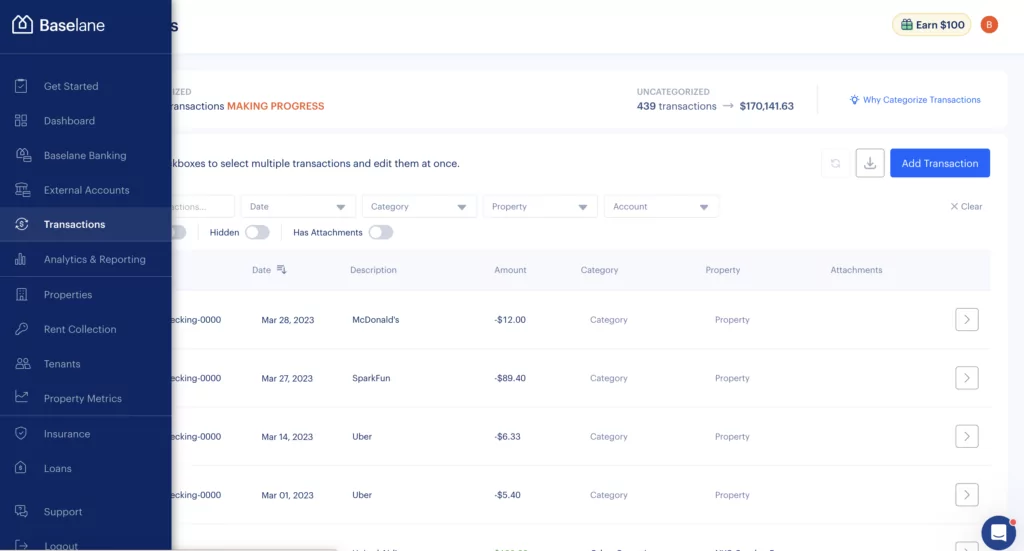
From there, you have to:
- Start: Go to the “Transactions” tab on the left-hand panel.
- Review Transactions: You can review all transactions registered in your bank accounts or credit cards that you connected here. Note that Baselane accounts appear by default.
- Transaction Ledger features: You can filter transactions by date, category, individual property or unit, and financial account. You may also conduct a search using keywords in case you’re trying to find a specific charge from a seller or tenant you know by name.
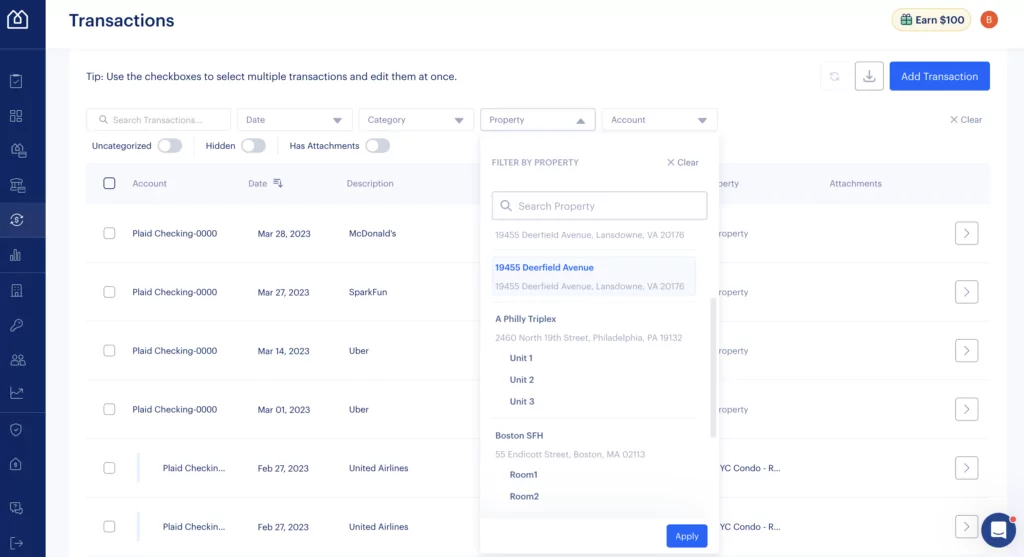
4. Add Manual Transactions: It’s possible for users also to add transactions manually, download a report with all financial movements, and complete other related actions from this page.
5. Analyze: You can navigate to the “Analytics and Reporting” tab on the left-hand panel and analyze your income and expenses. You can filter by date, expense type, report, or property here.
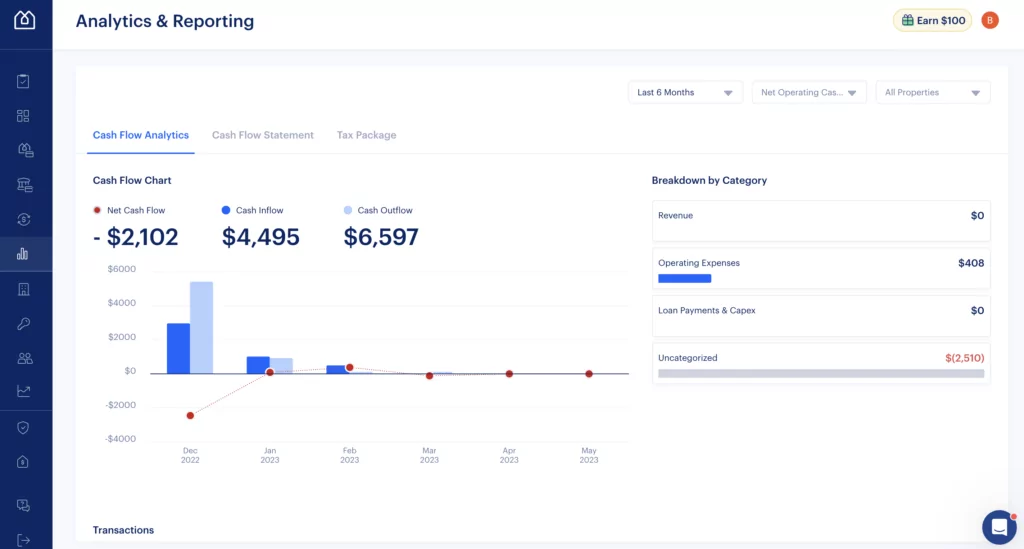
Say goodbye to spreadsheets
Get a consolidated ledger of all transactions categorized by property and Schedule E category.
Final Thoughts
Rental properties are like any other business — they require maintenance, upkeep, and regular care. Therefore, you must plan and anticipate the expenses you’ll have to cover.
As the article above suggests, having a reliable landlord banking solution and accounting tool can simplify your payments, taxes, and other expense-related tasks.
Baselane is an alternative offering robust financial and property management features for all owners.
Analyze cash flow in real-time with landlord bookkeeping software. Baselane’s bookkeeping for landlords breaks down finances by income and expense category and by property or unit, so you know exactly where your money goes.
Rental accounting made easy
- Consolidated ledger of all transactions
- 1-Click Schedule E categorization
- Auto-generated financial and tax reports
